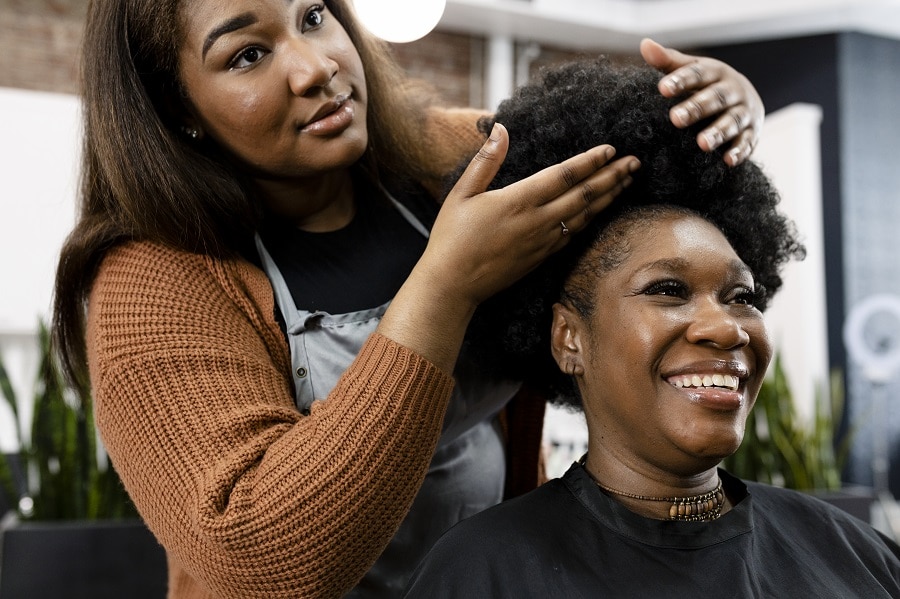When we think of the “older generation,” what often comes to mind are all the things that make them different from us. So, it’s no surprise that there are many habits that younger people just don’t understand. For example, why do they always choose a seat close to an exit? Or how come they’re not on Facebook or Snapchat? And while some of these habits younger people may find annoying, others can be pretty useful! Here are some everyday habits older people have that younger generations don’t understand
Always Talking About The Weather
What’s the weather like today? Are you enjoying this beautiful day? How does your garden grow? Older people are particularly fond of talking about the weather, as trivial as it may sound. They do it because they know that bad weather is something that most young people don’t have to worry about anymore. As children, they grew up when there were no central heating systems. They often had to walk just to get from one place to another during stormy nights with heavy rainfall.
The younger generation can also choose not to talk about the weather if they want because these days, they have an array of technology at their disposal, which allows them to check forecasts without actually having to step outside. For many older people, though, it is often less about checking forecasts and more about checking in with each other.
Stand In The Way When Traveling In Public Transport
Standing in the way when riding public transport is a habit which constantly irks young people who don’t understand it because it prevents them from sitting down. However, there are much more reasons why the older generation does this than many think. For one thing, not all older adults can afford a private form of transportation such as a car or scooter. Additionally, standing also helps prevent accidents because if one person trips while sitting down, the whole bus would have to suffer. The older generation also stands up for others because they don’t want to make everyone else uncomfortable by taking over all the seats.
The old generation doesn’t always stand in the way when riding public transport, but it is a habit many young people simply do not understand. It makes life more convenient for many other passengers who are happy that at least some people are considerate towards them.
Choosing Seats Close To Exits
The habit of always being near an exit when in public places is not something the older generation does just because they are senile or looking for attention. Instead, it is a habit that has been drilled into them since childhood. It was often safer to sit by an exit in case there were fires, tornadoes, floods, hurricanes, and so on. This also applied to young people who watched their parents do the same thing. Nowadays, though, most older people who have seen nothing but peace in their lives feel safe enough to sit anywhere without giving too much thought about exits.
Older People Want To Be Involved
Many young people don’t understand something so simple because they have never had a problem being alone. The older generation often wishes that there were more opportunities out there, if only so that they would have an excuse to interact with others during difficult times. This may come off as needy, but many elderly even enjoy being around younger people because it’s something different from their other daily routines.
The younger generation doesn’t understand this because they are used to being independent, so older people often come across as needy. It might make younger people uncomfortable, but many elderly even enjoy being around younger folks because it’s something different from what they are used to daily. However, the truth is that most older people would love for more opportunities out there, if only so that it gives them an excuse to interact with others during difficult times.
Having A Landline
Having a landline isn’t just about having something to talk with when the power goes out. Due to how many elderly grew up, they constantly worry about not contacting their children or other family members in case of an emergency. Many older people simply don’t understand why younger generations would ever want to go without having one due to its reliability and ease of use compared to cellular phones, which often run into problems in certain areas. Due to how many elderly grew up, they constantly worry about not contacting their children or other family members in case of an emergency.
Many younger people might find this habit strange because most of them often assume that everyone has access to a cellphone these days, but it’s more about peace of mind for most elderly. They’re always thinking ahead and since they grew up in an age where there were no cell phones and the only way to get in touch with somebody was via landline or face-to-face, they see it as a reminder of home.
Collecting All Their Change
Although not every older adult keeps their spare change, some collect it as a hobby. These people can often be seen taking walks around the block and coming back with pockets full of coins which they then must roll into paper rolls. It’s hard to understand why someone would take the time and effort to save something which has no severe monetary value nowadays, but this has been a tradition for most since they were children.
Young people might think that it’s strange to save something like spare change when in reality, many older people simply see it as part of their childhood habits. Older generations grew up during times where money was scarce, so they had to find ways of saving little by little just in case. In addition, the rise of digital transactions makes this an ancient practice since most people don’t carry cash around anymore.
Writing In Cursive
It might seem strange to young people, but many older folks enjoy writing in cursive instead of printing because it’s what they are used to. It also makes for a much easier signature since it’s simply more familiar. The younger generation has this stigma that cursive is outdated handwriting.
In reality, there are plenty of reasons why someone might prefer it, including knowing it is what they are most comfortable with when signing things and the fact that printing can be seen as annoying. It might seem strange to young people, but many older folks enjoy writing in cursive instead of printing because it’s what they are used to. It also makes for a much easier signature since it’s simply more familiar.
Younger generations might see this behavior as not being able to print legibly (which can lead to frustration). In contrast, older people who grew up without technology find familiarity within handwritten cursive, which goes back centuries and will always remain relevant. Plus, writing in cursive is simply seen as more personal, which can be meaningful for older folks who often live by themselves.
Always Having Hard Candy
The younger generation might see the availability of candy as something that can be found around at any given moment. Still, older people may prefer to keep candy on hand if they get starving. For example, it might be easier for them to choose a piece or two rather than making sure there’s food or nutritious snacks readily available. It also makes for better transportation since hard candy won’t spill everywhere if their bags are jostled about.
This can be seen as strange to younger people, but it’s simply a matter of being prepared for the worst. In addition, hard candy is often more affordable, so they can get a lot more of it without putting too much strain on their budget.
Always Getting Things Wrong
Older generations might view this behavior as simply being absentminded or forgetful when in reality, it could be due to some factors, including eyesight. In many cases, older folks often can’t see the TV screen very well and therefore have trouble distinguishing shows from one another, which is why they might ask someone to point out what show they’re watching.
An older person would view this habit as quickly leading to confusion, whereas a younger generation may realize that things get messed up sometimes. However, for those who are experiencing problems with their vision, asking if someone can help them figure out what they’re watching now makes perfect sense since they may not have been paying attention at all when flipping through channels.
Older People Having A Lot Of Rules
A younger person might view this habit as restricting and doesn’t understand why these rules exist in the first place. However, the older generation developed these rules and guidelines by living through a lot in their lives and therefore has strong opinions on how they should behave in particular situations.
For example, someone who grew up during World War II might have been raised to attend church on Sunday, whereas the younger generations may see this as an old-fashioned tradition. However, it’s due to personal beliefs of what makes one happy, which means there’s no reason why anyone should be judged for following these practices.
In addition, many older people view having ruled as a way of protecting themselves from harm since they’ve already experienced enough throughout their lifetime that they would simply rather err on the side of caution. Plus, many older generations don’t always trust technology to work, so they rule not to use it for anything important.
Older People’s Clothing And Fashion Sense
The difference in fashion sense can often be seen as frustrating by younger generations because they have no idea why an older person would wear too small or too large clothes. However, many older people still believe that clothing should fit tightly since it helps them feel more secure, whereas a looser fit can seem very uncomfortable.
Another aspect of this difference is that wearing clothes the right way matters just as much as what type of clothing it is. For example, there’s a lot to consider when wearing a sweater, including how tight the sleeves are and whether or not to button up all buttons.
In addition, there are certain outfits for different occasions passed down from one generation to another, so they simply follow what they were taught.
Always Asking For Help
Older people are used to asking for help because they know that it’s essential to do so. In many cases, there are certain things they aren’t able to do due to old age or even health issues which is why having someone else around can make the day go much more smoothly. However, younger generations might view this as an inconvenience and would rather live on their own without worrying about what someone else is doing.
The older generation views it, as usual, to ask for help since they know that physical strength isn’t something everyone has, especially if one’s health isn’t at its best. Also, regardless of whether or not the person helping them out is younger or older, it doesn’t matter because the point is that there is someone there to lend a hand which can be very comforting amidst the darkness.
Conclusion
Younger generations often think that older people act weird or quirky, whereas older people simply have different preferences. Many of their habits come from a lifestyle where they were always on the go because they didn’t have access to all the technology today. Their eyesight was better than ours is now, which is why specific rules and things like that can seem strange to younger generations.
Also, there are certain things that older people do because they want to protect themselves or simply like something about it. Younger generations need to remember that there was a time when what is normal now wasn’t always the case, and society changed many rules, not just in their own home.


